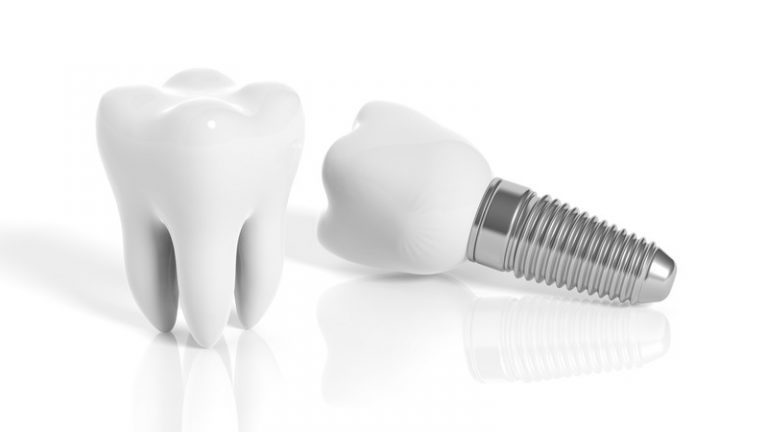The Advantages & Disadvantages of Zirconia Dental Implants
Zirconia dental implants, otherwise known as ceramic dental implants, are a recent advancement in oral surgery. You may have also heard a person or two accidentally call them “zirconium” dental implants. They meant these. They’re not those sparkly, diamond-like stones, but they’re pretty cool in their own right! As a natural, non-metal alternative to traditional titanium, these dental implants are resistant to corrosion and won’t trigger metal allergies. These implants are known to be hypoallergenic and safe for patients with sensitivity or allergies. Health and safety-wise, zirconia dental implants are the perfect solution for people with weak immune systems or autoimmune conditions. Holistic tooth replacement? Yes, please!
Zirconia Dental Implants Lend a More Natural Look
Another advantage to zirconia dental implants is they have a creamy white color — there is no risk of the dark color peeking through the gum line where the implant crown meets the implant’s body, which is a common complaint with titanium dental implants. Their appearance isn’t their only “natural” advantage over titanium. Since zirconia dental implants are ceramic, there’s no chance of heat conductivity or possibility of corrosion. They’re equally as good as, if not better than, titanium in its ability to osseointegrate; in fact, studies suggest the surface area of a zirconia dental implant is more conductive to bone growth than their titanium counterparts. What’s more, they’re more resistant to bacteria and plaque buildup.
A Recent Advancement in Oral Surgery and Holistic Tooth Replacement
The catch with zirconia dental implants is they are relatively new. They were first used in Europe in 1987, and have only been used in the US since 2007. That said, we don’t know much about their long-term efficacy. Traditional titanium dental implants are known to be a permanent solution to tooth replacement. While we expect similar results from ceramic dental implants, they haven’t been around long enough to know. So far, however, success in terms of bone integration and longevity is about the same as with titanium.
Common Issues with Zirconia Dental Implants
Patients who grind their teeth may experience difficulties, because ceramic does not hold up to the constant force as well as titanium. Zirconia dental implants can crack, especially with constant low temperature and/or humidity exposure. It is ceramic, after all. These limitations have led dental implant dentists to do two things to prevent a zirconia dental implant from cracking. 1) The diameter of a zirconia implant is more than its titanium counterpart, and 2) More dental bone grafting is done prior to installing the implant to ensure the jawbone has the strength to properly integrate the dental implant. For these reasons, zirconia dental implants aren’t always the best option for patients with bone density issues.
The Limitations of First-Generation Zirconia Dental Implants
Zirconia dental implants do have their challenges, especially with the first generation design, which was just one piece. (A titanium dental implant is two pieces: the implant “root” and the implant crown – the actual fake tooth part.) So when you’re working with a one-piece dental implant, its abutment position is very critical, because there is no way to place the implant and then attach the crown at a slightly different angle to go along with the surrounding teeth. Titanium dental implants have more leeway when it comes to their positioning. These one-piece ceramic dental implants present challenges in terms of the rigidity and stability of a cemented restoration. The lack of give and flexibility increases the chances of crushing or cracking the implant.
However, dental implant dentists now have access to zirconia dental implants that are two-piece designs, like their titanium counterparts, which have made these ceramic dental implants a much more viable alternative and has greatly reduced the functional complications of one-piece zirconia dental implants.
Zirconia dental implants also tend to be more expensive than titanium dental implants. Because of this, they are not always covered by dental insurance, as the insurance company’s point of view is, why spend more money when titanium dental implants are just fine?
Are Zirconia Dental Implants Truly Metal-Free?
Since zirconia dental implants are offered as a metal-free alternative to traditional implants for those who may be allergic to metal, many ask if zirconia is truly metal-free. Zirconia is manufactured from zirconium dioxide, but during the manufacturing process an irreversible chemical reaction occurs where electrons move from the zirconium to the oxygen molecules. As a result, ceramic zirconia has completely different material properties compared to the metal zirconium, including wear-resistance, toughness and conductivity. Zirconia is technically a “transitional metal” because of its production process, but that basically means it’s a ceramic. That’s why zirconia implants are known to be “metal-free” and a healthy alternative for those who may suffer from metal allergies.
As far as advancements in holistic tooth replacement go, zirconia dental implants have a lot of really cool implications. While we’re going to have to wait to find out if zirconia has the same lasting power as titanium, dental implant dentists seem to be confident their performance will be comparable.









